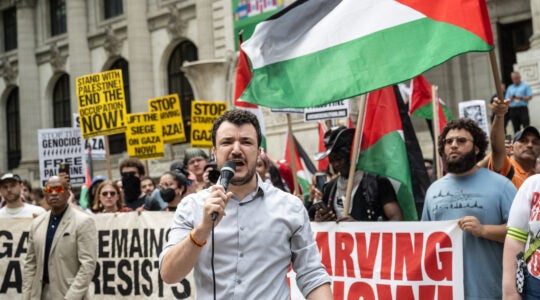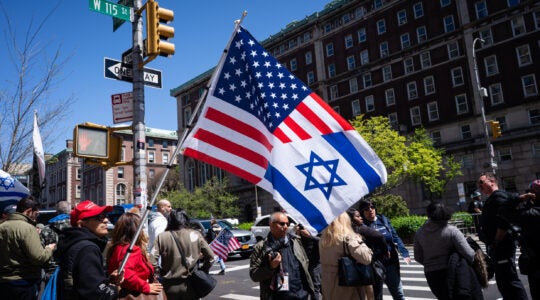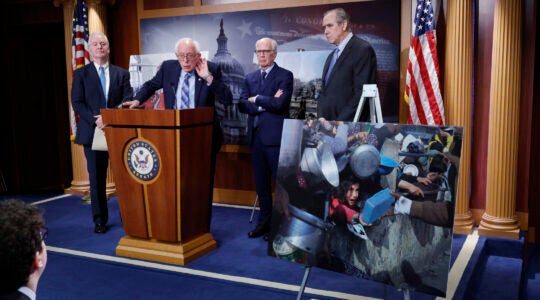NEW YORK (JTA) – A small, local protest against an Anti-Defamation League program in the Boston suburbs is shining a spotlight on the American Jewish community’s refusal to get behind a congressional bill acknowledging the Armenian genocide.
Introduced in Congress in 2005, the bill states that the Ottoman Empire massacred 1.5 million Armenians between 1915 and 1923, and calls on the president of the United States to recognize the killings as genocide. The measure is being vigorously opposed by Turkey, Israel’s closest ally in the Muslim world, which has enlisted a number of high-profile Washington lobbyists – including several with ties to Jewish groups – to press its case.
The Anti-Defamation League, along with B’nai B’rith International, American Jewish Committee and the Jewish Institute of National Security Affairs, say they are not taking a position on the bill. At the same time, however, they are echoing the Turkish line that the debate over what happened should be settled by historians, not American lawmakers; also, earlier this year, the four groups passed along to congressional leaders a letter from Turkish Jews opposing the resolution.
Until now, the consequences of such steps have been limited to a few critical articles, including a polemic entitled “Fire Foxman,” published on the Web magazine Jewcy.com. But now, anger over what some perceive as the ADL’s pandering to Turkey, is threatening to derail efforts by the organization to bring its highly regarded anti-gigotry program to Watertown.
The Armenian community of Watertown, Mass., – one of the largest in the country – is threatening to shut down the local “No Place for Hate” program, an ADL-sponsored initiative to certify communities that sponsor educational programs celebrating diversity.
“Here in Watertown, you can’t ignore the Armenian genocide,” said Ruth Thomasian, the sole Armenian member of Watertown’s “No Place for Hate” planning committee, which operates independently of ADL. “You can’t call it ‛alleged’ or ‛supposed’ or ‛research says.’ Genocide happened.”
The controversy began a month ago with a letter to the local weekly newspaper in Watertown, a community of some 32,000 people, of which as many as 20 percent are of Armenian descent. The letter, which called for the committee to sever ties with the ADL, sparked a flurry of responses; soon after, the controversy was the subject of a front-page story in the Boston Globe.
“The Armenian community in Watertown is a very important part of the fabric of the town,” said Will Twombly, the co-chair of the planning committee. “Needless to say, when this letter appeared in the newspaper lots of people had concerns about the issue, and questions as well.”
“This is not an issue where we take a position one way or the other,” Foxman told JTA, referring to the longstanding feud between Turkey and Armenians over the issue. “This is an issue that needs to be resolved by the parties, not by us. We are neither historians nor arbiters.”
Earlier this year, a delegation of Turkish Jews visiting Washington warned Jewish leaders that a resolution could harm Turkey’s tilt towards the West and create problems for the country’s Jews. Some 20,000 Jews live in Turkey, where a community has flourished for hundreds of years.
Though Jewish organizational leaders would not confirm that either the safety of Turkish Jews or the alliance with Israel factored into their position, Turkish Jewish leaders explicitly linked Israel’s well-being to the defeat of the resolution. In their letter to congressional leaders, the Turkish Jews noted the importance of close ties between Israel, the United States and Turkey, before warning that passage of the resolution could endanger American interests.
Around the same time, Foxman spoke out explicitly against the congressional resolution, saying it is not the job of Congress to settle the question. Foxman also asserted that, while massacres of Armenians undoubtedly did take place, the jury is still out on whether those massacres qualify as genocide. Such questioning has been rejected by Armenians as flat out wrong and described by scholars as disingenuous.
“It’s not a matter of debate,” said Deborah Lipstadt, a Holocaust scholar at Emory University. “There is an overwhelming consensus among historians that work in this area that there is no question that this is a genocide. You can’t deny this history.”
Joey Kurtzman, the author of the Jewcy article, told JTA that Jewish organizations should be “visible and vocal in standing with the Armenian community.”
“Unless Jewish Americans are comfortable for others to remain similarly agnostic about whether the Holocaust took place, we ought to be every bit as furious with Foxman as are Armenian Americans,” he said. “Foxman ought to issue a public retraction and an apology to the Armenian community, and also to the Jewish community. Barring that, he should be fired.”
In an apparent attempt to short-circuit the controversy playing out in Watertown, ADL’s Boston office seemed to backtrack from the organization’s line.
“ADL has never denied what happened at the close of the First World War,” the Boston officer asserted in a letter to be published later this week in the Boston Globe. “There were massacres of Armenians and great suffering at the hands of the Ottoman Empire. We believe today’s Turkish government should do more than it has done to come to grips with the past and reconcile with Armenians.”
The “No Place for Hate” committee and the ADL are currently working to set up a meeting. It appears unlikely that sentiments conveyed in the letter to the Boston Globe will be enough to assuage the anger that Armenians feel over what they see as a blatant denial of their history.
“We probably would have to sever our ties if the ADL does not get into a conversation with us and work this issue out,” Thomasian said. “This is a wonderful opportunity to have a public understanding of the whole nine yards of this denial, why perfectly reasonable people fall into traps like this.”
JTA has documented Jewish history in real-time for over a century. Keep our journalism strong by joining us in supporting independent, award-winning reporting.





